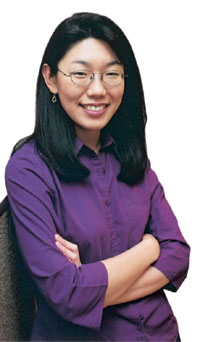The
View from Here: A Window on Conservatory Life
Editor’s note: Assistant Dean Gloria Kim wrote this article when she was an Oberlin student. She graduated in 2002.

Classical
Activist

There
are two very distinct kinds
of performers: those on stage and
those behind the scenes. I
learned this distinction in earnest after arriving at Oberlin,
where I was intent upon building a career as a pianist on
stage. I soon discovered an even greater enjoyment, behind the
scenes, guiding others who perform, creating opportunities for
audiences to grow musically, and realizing the powerful role music
plays in the fabric of life.
During the third year of my five-year double-degree, I became
a co-project director of Classical Action Oberlin, the first collegiate
branch of the New York-based Classical Action: Performing Arts
Against AIDS. This enormously satisfying collaborative work gave
me the chance to contribute to a music-making process that would
serve a beneficial and vital purpose raising money for AIDS-related
services and research. My Oberlin student colleagues (Hudie Broughton
'02 and Rick Sanford '03) and I had the honor of producing, in
the fall of 2000, Classical Action Oberlin's first annual benefit
concert.
Although work began in February of that year, it intensified in
the summer. With just two months before the concert, while I was
working as an intern at IMG Artists in midtown Manhattan, I was
on the "N" train, heading to the office. During the
15-minute ride on that humid summer day, my thoughts were focused
on a letter. My duties entailed requesting the sponsorship of
Oberlin's Central Ticket Service for our fall concert. Upon arriving
at IMG, I immediately started composing the letter in the hour
of quiet I could count on before the endless phone calls and e-mails
began to flow in.
Four hours later, I met Hudie and Rick at the Lincoln Center for
the Performing Arts, which served as our midpoint. (Conveniently,
we all had New York internships.) To plan for a concert featuring
Oberlin faculty, alumni, students, and a guest artist, we needed
to consider all aspects of production, including the concert's
goal, ticket sales, artist operations, publicity strategy, AIDS
awareness within Lorain County (Ohio), appropriate program and
artist selections, and collaboration with Classical Action in
New York. Coming together like a unified ensemble, we had a shared
vision: raising AIDS awareness in the greater Oberlin area and
producing an event of the highest possible quality. Yet, as a
newly formed ensemble, we were only able to work efficiently after
first coming to an understanding of our complementary skills and
personalities.
Back at Oberlin in September, I found myself juggling my time
between class work and concert preparation. At 3 a.m. I was typing
texts and translations for the concert program while my colleagues-in-production
were silk-screening posters. I stood by the Conservatory of Music
fax machine just two days prior to the concert, waiting for the
arrival of the program's proof copy before sending it along to
the printer. I grabbed each page as it spilled out of the machine,
scrutinized every word, and called Classical Action in New York
to make corrections. These small 11th-hour projects illustrated
that every detail is crucial to a production's success.
Although I tried to retain my composure, I was nervous throughout
the concert day. After all, I was still running around the campus,
setting up ticket sale desks, checking in with volunteers, and
recruiting ushers. Yet, I was able to resolve issues as they arose,
remembering what a well-respected arts administrator once told
me: "After all the hard work, all you can do during the final
hours is wait and expect the very best."
She was right!
I sensed warmth in Warner Concert Hall as the concert began. The
performers, including soprano Tony Arnold '90, tenor Carl Halvorson,
Associate Professor of Singing, soprano Marlene Ralis Rosen, Associate
Professor of Wind Conducting Timothy Weiss, and a contemporary
chamber ensemble composed of Oberlin students, played with intense
concentration while the audience listened closely to their careful
interpretation of the music.
Everyone seemed removed from the reality of this world, recreating
commemorative scenes from the past. Some of the audience members
had lost family members or friends to AIDS; some were there simply
to support the AIDS community. Regardless of their reasons for
attending, it was clear that the dream-like performances were
giving them a chance to recollect their memories, to remember
their loved ones.
During guest artist Carl Halvorson's moving performance of Igor
Stravinsky's In memoriam Dylan Thomas containing
the poet's admonition "Do Not Go Gentle into that Good Night,"
the hall was absolutely still. I saw some people in tears. Others
reflected quietly. I, too, sat quietly, observing their reactions.
I was speechless in fact, struck by the indescribable power of
music and its indefinable capacity to touch lives. To change lives.
I felt privileged to have had a hand in the experience.

"I
was speechless in fact, struck by the
indescribable power of music and its
indefinable capacity to touch lives.
To change lives. I felt privileged to have
had a hand in the experience."

Several
months later, I delivered a check to the Family Care Center's
Infectious Disease Center (IDC) in Lorain County. Handing the
concert proceeds to Debbie Ewers, IDC Director, was the most rewarding
moment of the entire experience. It reminded me of why I had invested
my time and energy into producing the benefit concert. All of
those e-mails, phone calls, meetings, Xerox copies, deadlines,
and sleepless nights seemed trivial and insignificant compared
to what that moment represented. Joy filled my heart a joy
that blinded me (for a while) to all of the problems and worries
of the world. I could not stop rejoicing for days, thinking about
how what we had accomplished would offer hope and support to others
and improve the quality of their lives, even just a little bit.
Indeed, I have found an outlet to express my passion for music.
I can achieve many goals educationally, inspirationally,
and socially while sharing my life-long love. None of this
would be possible, however, without a true devotion to the artistic
product. My love for music is my leader, guiding me to find radiant
joy in the administrative roles I pursue in the arts. I have learned
that the most valuable aspect of arts administration is that it
cannot be detached from the creative and interpretive process.
During both of her summer breaks, Gloria has worked as an intern,
first at the Los Angeles Philharmonic Orchestra, and then at the
Aspen Music Festival and School. She spent winter term 2000 as
an arts administration intern at Chamber Music America. A Shouse
Nonprofit Leadership Scholar, Gloria will graduate in May 2002
with a Bachelor of Music degree in piano performance and a Bachelor
of Arts degree in arts administration, a self-designed major.


